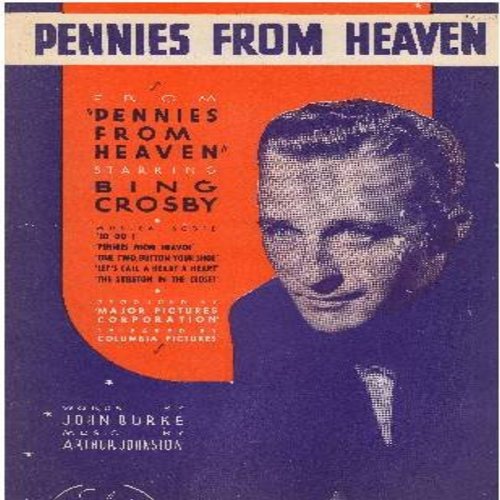
When Popular American Song became Big Business, it was inevitable the songwriters would have to stay closely in touch with what the song-hungry, song-buying public was feeling and thinking. And what (other than Love in all its incarnations) occupies the human brain more than Money?
More often than not, the bards of Tin Pan Alley, Broadway and Hollywood mixed our two great preoccupations together, creating countless reflections on Having It All…or not. During the Depression and WWII years, musical romance flowered when security was in short supply.
This Lecture-in-Song is divided among a variety of topics surrounding Money and Love: Pure Romance (“The Best Things In Life Are Free,” “A Cup Of Coffee, A Sandwich And You”); Total Cynicism (“Money Makes The World Go ‘Round,” “Why Don´t You Do Right?”); Morality Tales (“A Bird In A Gilded Cage,” “Dinner For One, Please, James”); Poverty (“Nobody Knows You When You´re Down & Out,” “God Bless The Child,”); Deals With The Devil (“Just A Gigolo,” “Minnie The Moocher,” “Diamonds Are A Girl´s Best Friend”); Irving Berlin´s uniquely prolific obsession with Love & Lucre (“Puttin´ On The Ritz,” “Getting Nowhere,” “Marrying For Love,” “Harlem On My Mind,”); and a final climactic medley from The Great Depression ranging from despair (“Brother, Can You Spare A Dime?, “Ten Cents A Dance”) to optimistic exhilaration (“Life Is Just A Bowl Of Cherries,” “Who Cares?,” “I Got Rhythm,” “I´ve Got Five Dollars,” “I Got Plenty Of Nuttin´,” “Walkin´ My Baby Back Home,” “A Pocketful Of Dreams,” “On The Sunny Side Of The Street,”, “Pennies From Heaven”).
Nothing changes in human affairs when it comes to the eternal cycle of Good Times switching with Bad Times and back again; and nothing is quite so uplifting, anytime, as the Great American Popular Songs:
“Oh we ain´t got a barrel of money.
Maybe we´re ragged and funny;
But we´ll travel along,
Singing a song,
Side by Side!”
If you would like to engage Fred Miller for one of his Lectures-in-Song, please contact him directly at any time. For a full listing of all Lectures, click here.
Fred Miller’s Lectures-In-Song comprise a series of solo programs, each an historical, anecdotal and musical profile of some great personality or important aspect of American Popular Song. These Lectures are delivered by singer/pianist/narrator Miller at the piano, and each reflects his lifetime passion and appreciation for great music. He studied classical piano in his hometown of Albuquerque from ages 7-15 but early on gave up any notion of music as a profession. At that time, Fred assumed a musical career was either one devoted to the rigid discipline of classical music or being a freewheeling rock star, and he accurately decided he had no aptitude for either. However, at age 22, upon hearing Ella Fitzgerald sing Cole Porter, he found his calling and life’s mission.
Through the Seventies and Eighties, Miller studied and absorbed in minute detail the life and times and songs of nearly all the great American composers and lyricists who thrived during Broadway & Hollywood’s Golden Age between the two World Wars. In 1987, he founded Silver Dollar Productions in order to produce operettas, dramas, musicals and small cabarets. Silver Dollar Productions required ensemble casts, props, costumes and, most significantly, the challenges of publicity and selling tickets, and for a dozen busy years, the company presented an unbroken string of varied and highly lauded performances.
In 1999, Miller was simultaneously underwritten by both his local Hunterdon County Library and the Art Alliance of Philadelphia to present a series of six solo Lectures-In-Song, each devoted to one of the premiere Broadway/Hollywood songwriters: George Gershwin, Cole Porter, Irving Berlin, Richard Rodgers, Jerome Kern, and Harold Arlen.
In presenting history, biography and psychology while sitting at a piano singing the superlative songs of his heroes, Miller has found a single performing medium that utilizes most of his intellectual and musical passions.The list of Lectures-In-Song that began with six in 1999 is now more than seventy(and growing!), a joyful tribute to the boundlessly rich field of American Popular Song.
